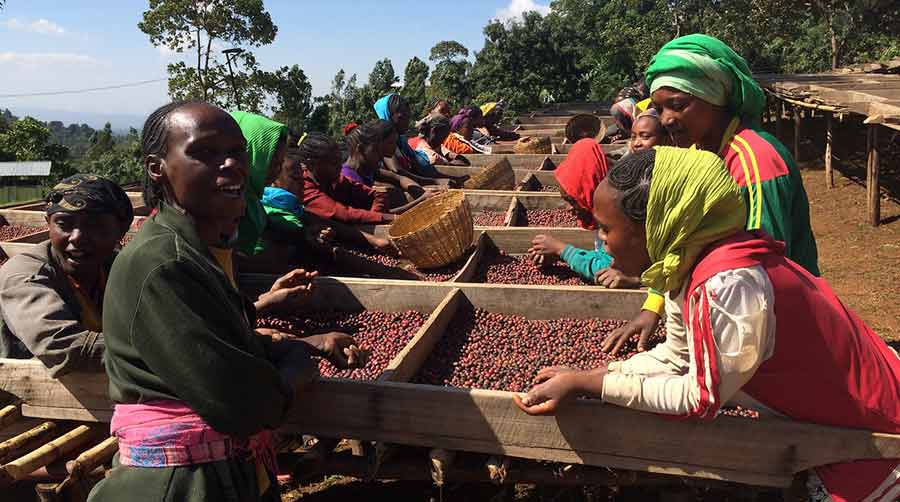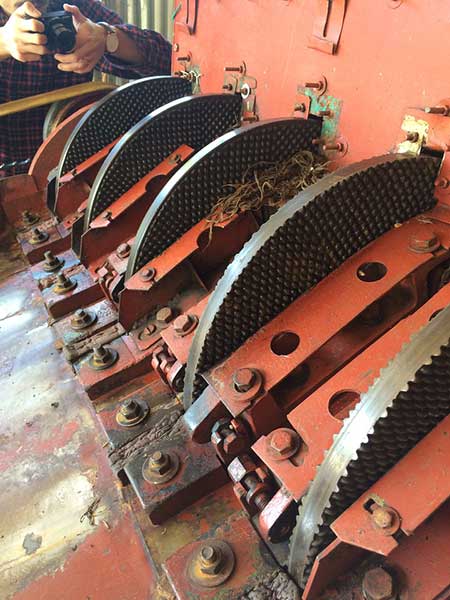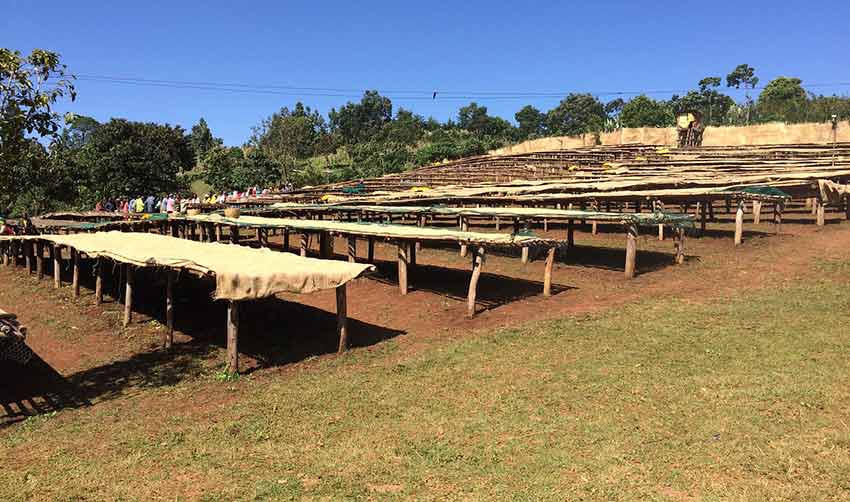-
Producer
-
Kochere Wetmill Through Primrose
-
Country
- Ethiopia
-
Region
-
Gedeo, Yirgacheffe
-
Altitude
-
1950m above sea level
-
Variety
-
Process
-
Importer
-
Silo
-
Body
-
Light
-
Acidity
-
Balanced
-
Tasting notes
-
Bergamot, jasmine, black tea
-
Roast style
Ethiopia
Kochere Primrose
If the name Kochere is familiar, it's because we’ve previously shared other coffees from the same washing station. This delivery is a different lot with similar flavours but a slightly lighter body.
Ethiopia’s the birthplace of coffee: today around 25% of the country's livelihood is reliant on its export, and this lot is Ethiopian Heirloom which is a mix of naturally occurring varietals.
Around 9 years ago the Ethiopian government made some radical changes to the way coffee is exported, requiring it to be traded on the Ethiopian Commodity Exchange (ECX) with the aim of protecting the income of farmers.
Unfortunately those changes reduced traceability, making it impossible to directly trade with small single farms. The only way to purchase coffee from Ethiopia was through unions who represent cooperatives, from exporters who buy through the ECX, and from large estates.
While helping buffer commodity-quality crops from price volatility, this also stopped higher quality coffee from reaching its full earning potential. We’re referring to this delivery as ‘Kochere Primrose’ to tell it apart &emdash; Primrose is the Ethiopian exporter for this lot.Changes have been announced which will hopefully bring more balance. Direct trade will soon be possible, and there'll be more traceability. A minimum price for farmers will be set, and a trading range limit on the ECX will stop large daily price swings. Daily Coffee News has more info on these changes, too.
Yirgacheffe
Yirgacheffe is well known for its high quality washed coffees, which are clean, floral and juicy coffees with genuine and unique fruit and berry flavours.
The area where this coffee is grown has some of the most complex and intense coffee flavours in Yirgacheffe. Most are small family plots with a mix of traditional varietals, and recently planted trees of improved varietals. Organic fertiliser is common, though pruning is less common, given the small size of the individual plots.
Coffee processing at Kochere
 Hand sorting coffee cherries Photo: Nordic Approach
Hand sorting coffee cherries Photo: Nordic Approach
Coffee cherries are collected from seven different hillsides surrounding the wetmill. These are hand-sorted to remove any unripe or overripe cherries before are approved.
 Hand sorting coffee cherries Photo: Nordic Approach
Hand sorting coffee cherries Photo: Nordic Approach
A four disc Hagbes pulper removes the skin and pulp.
The coffee is then fermented under water for 24-36 hours, depending on the weather conditions.
It’s then graded in washing channels in to two grades based on density, and then soaked under clean water in tanks for 12-24 hours.
 Raised drying beds Photo: Nordic Approach
Raised drying beds Photo: Nordic Approach
They continue to handpick defected parchment at the drying tables, where the coffee is sun dried for 10–15 days days resting on hessian cloths on African drying beds. They’re covered by plastic during midday to protect from the intense midday sun, and also overnight.
Learn everything about this coffee:
Ethical, traceable sourcing
This page has all the sourcing information (variety, process, region, story, importer, and more) that our importers share with us, and give us permission to use.
The transparency helps us talk confidently about the quality and background of our product, and it helps you know exactly what you’re buying.
Learn more:
Coffee page transparency legend
Our coffee philosophy
Our business approach
Fresh harvest coffee
We only source and roast coffee from each country’s latest harvest season (so the green coffee is never older than 1 year from the time of picking, processing and packing). This ensures the sensory qualities are always at their peak and unaffected by excessive ageing.
Roasted for espresso and filter (best enjoyed black)
Roast style: omni. Omni roasts are designed to brew and taste great both as espresso and filter. Our omni single origins generally sit on Agtron values in the ~70-60 value range. So, technically, they are somewhere in the lighter side of the medium spectrum.
Designed for espresso and filter brewing. Best enjoyed black.
Learn more:
Our Loring Kestrel S35 roaster
Our roasting style and approach
Best brewed within days 15-49 post-roast
The ‘fresh is best’ saying doesn’t apply to coffee (contrary to popular belief). Waiting before opening and brewing your bag of whole coffee beans helps develop peak flavour and acidity.
But heads up: if you buy pre-ground coffee, brew it as soon as possible.
Learn more:
Our recommended brewing window
Try our custom brewing recipes
Our recipes and ratios are tailored to our coffee sourcing and roasting styles, bringing the best flavour and feel out of each coffee.
For pour over, immersion, and other filter brewing styles, check our brew guides.
For our espresso single origins, we recommend a coffee:yield ratio of 1:3:
- Dose: 20g ground coffee
- Yield: 60g espresso
- Total brew time: ~24-28 seconds
This is just a starting point! We encourage you to experiment, taste, and adjust to find the recipe that you enjoy the most.
Learn more:
Our espresso brew guide (single origin)
Brewing ratio calculator
Packaging and sustainability
- Bags: ABA-certified home compostable (AS 5810-2010)
- Labels: recyclable
- Valves (only on +250g bags): general waste
- Box and tape (online orders): recyclable
Learn more:
Our packaging
Variety
Ethiopian Heirloom variety
Heirloom (or sometimes Landrace) is an umbrella term that refers to all the coffee varietals endemic to Ethiopia.
The location
Coffee from Ethiopia
Seen as the birthplace of domesticated coffee, there are not many more exciting times at the Sample warehouse as when our fresh Ethiopian lots arrive. Legend says it’s our favourite origin…
The Yirgacheffe region of Ethiopia
Unique for its floral and highly aromatic coffees. Some our of very favourite and memorable Ethiopian coffees have emerged from this legendary region.
Farm processes
Washed process
Machines are used to remove the flesh from the coffee cherry before being fermented in water, washed again, and finally sun dried. This process tends to result in more distinct, cleaner flavours.

Subscribe to a world of coffee
Discover a new single origin coffee from Sample every 1-5 weeks with no delivery fees.
No up-front purchase, and you can pause, cancel, or change plans at any time.
Available to order online this week:

Rwanda Kibirizi
Flavours of mandarin, raisin, apple
Body Acidity
Washed Bourbon
June 2025 harvest
Roasted omni for filter and espresso
Rwanda Kibirizi online
Kenya Karimikui
Flavours of blood orange, blackberry, plum jam
Body Acidity
Washed Batian, SL28, SL34, Ruiru 11
November 2024 harvest
Roasted omni for filter and espresso
Kenya Karimikui online
Mexico Isavel Lopez Pablo
Flavours of sugarcane, dried cranberry, white peach
Body Acidity
Washed Typica
April 2025 harvest
Roasted omni for filter and espresso
Mexico Isavel Lopez Pablo online
Peru Miguel Estela
Flavours of honeydew melon, white grape, marmalade
Body Acidity
Washed Marshell
August 2025 harvest
Roasted omni for filter and espresso
Peru Miguel Estela online